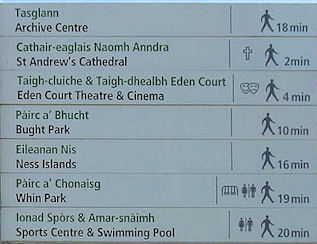
Photo of Bi-lingual Sign in Inverness via Wikimedia
This is the index page to a number of sections on the Rampant Scotland site which relate to the Gaelic Language. They were previously published in the "Scottish Radiance" e-magazine Web site.
- Gaelic Phrases for Every Day Some simple sayings in Scots Gaelic, English and phonetics. (Previously published in the "Scottish Radiance" e-magazine Web site).
- Gàidhlig Some phrases in Scots Gaelic with Audio Clips and written translations. (Previously published in the "Scottish Radiance" e-magazine Web site).
- Far and Wide / Fada's Farsaing Aspects of Scottish and Gaelic culture in both Gaelic and English. (Previously published in the "Scottish Radiance" e-magazine Web site).

- Learning Gaelic - A Personalised Method There is a certain magic to learning rare languages. So let's take a look at some of the best ways to approach learning Scottish Gaelic.

Gaelic Pronunciation Generally stress in Gaelic falls on the first syllable of the word, eg. doras (dor'us) a door. There are 18 letters in the Gaelic language. The letters J, K, Q, V, W, X, Y, and Z are not included in the Gaelic alphabet, but are sometimes found in borrowed words. When present, these letters have their English sounds. Gaelic vowels have a grave accent, with the letters à, è, ì, ò, ù.
Vowels ó a long sound as in 'tone' ò a short sound as in 'job' é as in 'say' è as in 'get' à as in 'car' a as in 'cat' but also often sounds like 'uh', eg. aran (ar'un) bread i as in 'with' ì long sound as in 'need' u as in 'but' ù long sound as in 'food' Some Consonants mh/bh/db these consonants are normally pronounced as an English 'v' sound, especially when at the end of a word, eg. làmh (lav) hand; gabh (gav) take mh when this appears in the middle of a word, it is often pronounced as an English 'w', eg. Samhain (Sa-oo-win) dh like a muffled 'g', eg. dhomh (gove), as if you are breathing out at the same time gh like a 'y' sound fh normally silent ch as in 'loch' (a gutteral k) c this is always hard like a 'k' d when followed by either 'e' or 'i' is pronounced almost like a 'j', eg. deich (jech) ten; dearg (jarrig) red l when followed by either 'e' or 'i' it is pronounced as in the word 'million', eg. leabhar (lyo-ur) a book s when followed by either 'e' or 'i' it is pronounced as 'sh', eg. sìnnsear (shin-shur) ancestor t followed by 'e' or 'i' is pronounced as in the word 'catch', eg. teth (cheh) hot; tìr (cheer) land, country
There is also a more extensive guide to Scottish Gaelic pronunciations at Wiktionary, the open content dictionary.
And don't forget the Gaelic links page to lots of Gaelic resources - including dictionaries!



